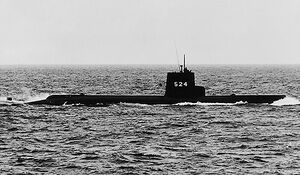Engineering:Natsushio-class submarine
 JS Fuyushio
| |
| Class overview | |
|---|---|
| Name: | Natsushio class |
| Builders: |
|
| Operators: |
|
| Preceded by: | Script error: The function "sclass" does not exist. |
| Succeeded by: | Ōshio class |
| Built: | 1961–1963 |
| In commission: | 1963–1978 |
| Planned: | 2 |
| Completed: | 2 |
| Retired: | 2 |
| General characteristics | |
| Type: | Coastal attack submarine |
| Displacement: | 690 long tons (701 t) surfaced |
| Length: | 61 m (200 ft 2 in) |
| Beam: | 6.5 m (21 ft 4 in) |
| Draft: | 4.1 m (13 ft 5 in) |
| Propulsion: | |
| Speed: |
|
| Complement: | 43 |
| Armament: | 3 × 533 mm (21 in) torpedo tubes |
The Natsushio-class submarines were a pair of submarines constructed and operated by the Japan Maritime Self-Defense Force during the Cold War. They were a development of the Script error: The function "sclass" does not exist.s and are sometimes considered the same class. They were small and limited in capability but were thought to be a successful class. They entered service in 1963–1964 and were deleted in 1978.
Design and description
The Natsushios were a development of the preceding Script error: The function "sclass" does not exist. and are sometimes considered the same class.[1][2][3] They shared many of the same characteristics with small design improvements. They were small submarines with limited capability[1] but considered handy and a successful class.[4] They were air-conditioned and had good habitability for the crews. The submarines measured 61 meters (200 ft 2 in) long overall with a beam of 6.5 m (21 ft 4 in) and a draft of 4.1 m (13 ft 5 in). The submarines had a standard displacement of 780 long tons (790 t), with a surfaced displacement of 690 long tons (700 t) and 850 long tons (860 t) submerged.[1][3]
The vessels were powered by a diesel-electric system. Two shafts were powered by two Sulzer-Mitsubishi diesel engines creating 1,350 brake horsepower (1,010 kW) and two electric motors creating 1,700 shaft horsepower (1,300 kW). This gave the submarines a maximum speed of 12 knots (22 km/h; 14 mph) surfaced and 15 knots (28 km/h; 17 mph) submerged.[1][lower-alpha 1] The Natsushios were armed with three 533-millimeter (21 in) torpedo tubes in the bow. They had a crew of 43.[1]
Boats in class
| Natsushio class construction data[1] | ||||||
|---|---|---|---|---|---|---|
| Pennant no. | Name | Laid down | Launched | Commissioned | Fate | |
| SS-523 | Natsushio (なつしお) | 5 December 1961 | 18 September 1962 | 29 June 1963 | Deleted 20 March 1978 | |
| SS-524 | Fuyushio (ふゆしお) | 6 December 1961 | 14 December 1962 | 17 September 1963 | Deleted 20 June 1978 | |
See also
- Script error: The function "sclass" does not exist. - Soviet Navy
- Script error: The function "sclass" does not exist. - Royal Swedish Navy
- Script error: The function "sclass" does not exist. - Italian Navy
- Script error: The function "sclass" does not exist. - Imperial Japanese Navy
- Script error: The function "sclass" does not exist. - Imperial Japanese Navy
Notes
Citations
- ↑ 1.0 1.1 1.2 1.3 1.4 1.5 Gardiner, Chumbley & Budzbon 1995, p. 235.
- ↑ 2.0 2.1 Blackman 1969, p. 181.
- ↑ 3.0 3.1 Couhat 1976, p. 243.
- ↑ 4.0 4.1 Moore 1976, p. 281.
References
- Blackman, Raymond V. B., ed (1969). Jane's Fighting Ships 1969–70. New York: McGraw-Hill Book Company. OCLC 30910135.
- Couhat, Jean Labayle, ed (1976). Combat Fleets of the World 1976/77: Their Ships, Aircraft, and Armament. Annapolis, Maryland: Naval Institute Press. ISBN 0-87021-183-8.
- Conway's All the World's Fighting Ships 1947–1995. Annapolis, Maryland: Naval Institute Press. 1995. ISBN 1-55750-132-7.
- Moore, John, ed (1976). Jane's Fighting Ships 1976–77 (79th ed.). New York: Franklin Watts Incorporated. ISBN 0-531-03261-2.
Template:Natsushio class submarines Template:Combatant ship classes of the Japan Maritime Self-Defense Force
 |
